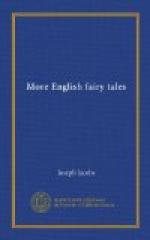“Seven long years
I served for thee,
The glassy hill
I clomb for thee,
Thy bloody clothes
I wrang for thee;
And wilt thou
not waken and turn to me?”
[Illustration: THE GLASSY HILL I CLOMB FOR THEE]
Next day she knew not what to do for grief. Then she broke the pear, and found it filled with jewellery far richer than the contents of the apple. With these jewels she bargained for permission to be a second night in the young knight’s chamber; but the old wife gave him another sleeping drink, and again he slept till morning. All night she kept sighing and singing as before:
“Seven long years
I served for thee,
The glassy hill
I clomb for thee,
Thy bloody clothes
I wrang for thee;
And wilt thou
not waken and turn to me?”
Still he slept, and she nearly lost hope altogether, But that day, when he was out hunting, somebody asked him what noise and moaning was that they heard all last night in his bedchamber. He said: “I have heard no noise.” But they assured him there was; and he resolved to keep waking that night to try what he could hear. That being the third night and the damsel being between hope and despair, she broke her plum, and it held far the richest jewellery of the three. She bargained as before; and the old wife, as before, took in the sleeping drink to the young knight’s chamber; but he told her he couldn’t drink it that night without sweetening. And when she went away for some honey to sweeten it with, he poured out the drink, and so made the old wife think he had drunk it. They all went to bed again, and the damsel began, as before, singing:
“Seven long years
I served for thee,
The glassy hill
I clomb for thee,
Thy bloody clothes
I wrang for thee;
And wilt thou
not waken and turn to me?”
He heard, and turned to her. And she told him all that had befallen her, and he told her all that had happened to him. And he caused the old washerwife and her daughter to be burnt. And they were married, and he and she are living happy to this day for aught I know.




